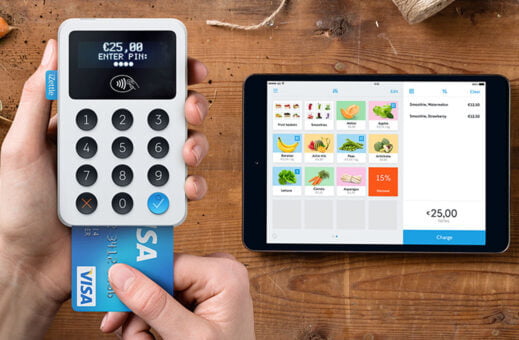iZettle turns iPhones into Point of Sales payment terminals
On June 28th, 2012, just before I spoke at the marketforce future of cards and payments conference in London, I was lucky enough to attend Jacob de Geer’s presentation on iZettle, a POS payment terminals solution. De Geer started his career by being the first employee of Tradedoubler as its MD in 1999. He was introduced by the moderator as a “serial entrepreneur” and his latest invention is an amazing device which turns your iPhone into a payments point-of-sale terminal; let’s delve into the details of this magical device.
iZettle turns iPhones into Point of Sales payment terminals

A business born out of the frustration of a small business owner
“I’m a bit of a payments rookie” Jacob de Geer admitted as an introduction. In fact, the idea for his latest invention came from his wife when she once came home and she was very frustrated about the fact that she was not able to accept payments and therefore she missed 50% of the business she could have done. “It is time you do something useful!” she added and that was what prompted Jacob to found this new start-up.
Devices turning smartphones into payment terminals aren’t something entirely new though, there is already one company in the US called “Square” which does this, but it is using magnetic stripe technology whereas “Europe is a different animal” as Jacob pointed out.
The company was started in April 2010, and it partnered with “talents from all over Europe in order to form a virtual company” de Geer said. What is most amazing about this is that “90% of the infrastructure’s in the cloud and 5% in the hardware”; yet, the most important thing is that Jacob de Geer managed to get his device EMV – certified.
There aren’t any fees, only 2.75% of transactions taken from individuals and small businesses. Daily deposits are then transferred to individual bank accounts.
On day one, 10,000 merchants signed up to the service in Sweden “a country in which there are only 9 million inhabitants” de Geer said, so this is a real achievement! But the traction which iZettle got from that was from all over the world, and not just from the Nordics.
The target is that of “sub-SMEs and prosumers”; a market which, according to Jacob de Geer, is not very well catered for. It is mostly made of 1– 2/3 employee companies but it represents “10 to 15% of the GDP of Europe!” he added. These are the only ones that iZettle is catering for de Geer added.
The smartphone penetration has gone up 33% versus 2% estimated point-of-sale penetration Jacob said. “We can therefore broaden revenue streams in this market”, the Swedish entrepreneur said. The main target is electricians, blacksmiths, plumbers, taxi drivers, etc.
“This is good business, there isn’t any competitionMarket definition in B2B and B2C - The very notion of "market" is at the heart of any marketing approach. A market can be defined... with Banks” he added. In the Nordics only there are now 50,000 merchants in operations who were signed up by iZettle in the past six months according to its owner and founder.
iZettle launching in the UK … without Visa
And for the past few weeks, iZettle has also been available in the UK: “We signed up a couple of thousands in the first day” Jacob announced. And yet, “we use no advertising at all”. The device is approved by most card schemes thanks to the creation of a commission split between card schemes and iZettle, but a major setback is that Visa is not part of the experiment in the UK: “they didn’t want to participate” Jacob de Geer added.
So far, iZettle is available in five different markets (4 Nordic countries and the UK). There aren’t any plans that I’m aware of for expanding to other countries, but I can see no reason why what worked in England wouldn’t work in certain countries such as Germany or France, the latter having 22-year-old field experience with chip and pin.
Are consumers worried?
“No! they aren’t” Jacobs declared “because of the benefit of the chip”; as to fraud levels, “they are significantly lower than standard chip and pin” Jacobs said, mostly because transactions are carried out face to face. Yet, the entrepreneur is “not naive” and he knows that “someday something bad will happen”.
But this is the reason why the iZettle company has set up a limit for how many payments can be received daily: “€3000 for individuals, and €6000 for businesses” and “this is sufficient” Jacob de Geer added. The average transaction is at €65, which is “significantly higher than the rest of the industry” de Geer added.
Convenience over security …
Once again (as we did when we started Internet Banking in the 1990’s) this is proving that convenience is more important than security. iZettle is changing the ballgame by bringing payment terminals to places where they weren’t available before. That in itself is worth the risk which by the way is carried by insurance companies and iZettle themselves.
A bright future for iZettle
I think it is pretty easy to predict a very bright future for the company. There is an area which puzzles me a bit though: the fact that Visa wasn’t part of the scheme in the UK, is a bit of a shame in my eyes. I find the device so clever … I hope they will jump on the band-waggon soon.
There are two other directions in which iZettle could well develop in my opinion: for one, other European countries with a much bigger footprint, and second the ability to cater for smartphones which aren’t iPhones and, above all, android phones.
This of course would make it a lot more difficult because a lot of devices exist in the market but I’m certain that an elegant solution can be found. After all, the mobile world is all about Android now, as MWC demonstrated in Barcelona last February (see our full coverage here).
Last but not least, Jacob de Geer is a very impressive entrepreneur: soft-spoken, cool-headed and extremely professional, yet anything but smug or haughty. And while he talked, all were listening in the room. It’s true that we’d looked into how to use mobiles for payments for one and a half-day and a young entrepreneur from Sweden was showing us how to do it.
- Nobody understands how AI works - 23/03/2024
- Naturally Smart Writing, Beyond the Artificial - 18/03/2024
- LinkedIn’s new features under the microscope - 14/03/2024





iZettle’s rival mPowa has just launched in the UK and it clearly has the edge because it takes VISA http://www.biz-works.net/index.php5?&fl=y&pgid=bp&art=287 iZettle is useless without VISA. What were they thinking?
I agree with John, not supporting Visa is a drawback. Aside from that mPowa is looking really good if you want to know what I mean just check their site http://www.mpowa.com. I just signed up and excited to get my reader!